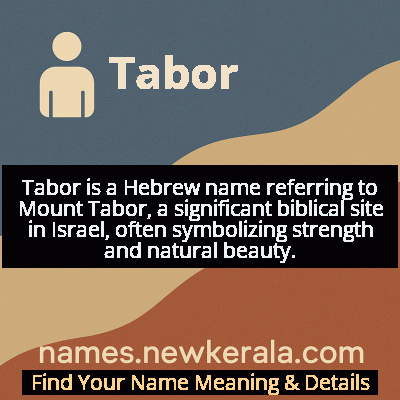Tabor Name Meaning & Details
Origin, Popularity, Numerology Analysis & Name Meaning of Tabor
Discover the origin, meaning, and cultural significance of the name TABOR. Delve into its historical roots and explore the lasting impact it has had on communities and traditions.
Name
Tabor
Gender
Male
Origin
Hebrew
Lucky Number
2
Meaning of the Name - Tabor
Tabor is a Hebrew name referring to Mount Tabor, a significant biblical site in Israel, often symbolizing strength and natural beauty.
Tabor - Complete Numerology Analysis
Your Numerology Number
Based on Pythagorean Numerology System
Ruling Planet
Moon
Positive Nature
Diplomatic, friendly, artistic, empathetic.
Negative Traits
Over-sensitive, moody, indecisive, prone to self-pity.
Lucky Colours
Green, cream, white.
Lucky Days
Monday.
Lucky Stones
Pearl, moonstone.
Harmony Numbers
1, 3, 4.
Best Suited Professions
Diplomats, mediators, caregivers, artists.
What People Like About You
Cooperative spirit, friendliness, artistic talent.
Famous People Named Tabor
Tabor J. Anderson
American physician
Pioneering medical researcher and one of the founders of modern pathology
Tabor Sullivan
American frontiersman
Legendary mountain man and guide who helped map western territories
Tabor Novak
Czech composer
Influential classical composer known for blending traditional and modern musical styles
Tabor Kane
British architect
Award-winning sustainable architect known for innovative eco-friendly designs
Name Variations & International Equivalents
Click on blue names to explore their detailed meanings. Gray names with will be available soon.
Cultural & Historical Significance
The mountain's distinctive dome shape rising abruptly from the Jezreel Valley has made it a natural fortress and spiritual center, influencing art, literature, and religious thought across multiple cultures and centuries. Beyond its religious significance, the name Tabor appears in various geographical contexts worldwide, from Tabor, South Dakota to Mount Tabor, Oregon, demonstrating how the name traveled with settlers and explorers. In Czech culture, Tábor gives its name to a historic city that served as a center for the Hussite movement, adding layers of reformation and resistance symbolism to the name's cultural legacy.
Extended Personality Analysis
Individuals named Tabor are often characterized by their strong, grounded nature and natural leadership qualities. Like the mountain that inspires their name, they tend to be stable, reliable, and possess an inner strength that others find comforting. They often exhibit strategic thinking abilities, able to see the 'big picture' and make calculated decisions. Many Tabors demonstrate a spiritual or philosophical depth, showing interest in meaningful conversations and ethical considerations.
Their personality often combines practicality with vision - they can be both feet-on-the-ground realists while maintaining lofty ideals and aspirations. This balance makes them effective in roles requiring both practical implementation and creative problem-solving. They typically value tradition and history while being open to innovation when it serves a greater purpose. In social settings, Tabors often serve as the 'rock' in their relationships - dependable friends who provide wise counsel and steady support during turbulent times. Their natural authority is usually tempered with humility, making them respected rather than authoritarian leaders.
Modern Usage & Popularity
In contemporary naming practices, Tabor remains a distinctive but uncommon choice, primarily used in English-speaking countries and among Jewish communities. The name has maintained steady but low usage since the 19th century, never reaching the popularity charts but consistently appearing in birth records. Recent years have seen a slight uptick in usage as parents seek biblical names that are familiar yet uncommon. It's particularly popular among families with connections to Israel or those appreciating geographical names. Modern usage often positions Tabor as a strong, masculine alternative to more common biblical names like Caleb or Joshua. The name appeals to parents seeking names with deep historical roots, spiritual significance, and natural imagery without being overly trendy or popular. Social media analysis shows the name is most commonly used in the United States, United Kingdom, Canada, and Australia, with occasional usage in European countries with Christian heritage.
Symbolic & Spiritual Meanings
Symbolically, Tabor represents elevation, stability, and spiritual awakening. As a mountain name, it carries connotations of strength, permanence, and majesty - suggesting someone who stands firm through challenges and provides a reliable foundation for others. The biblical associations add layers of spiritual symbolism, representing divine encounters, transformation, and victory. In metaphorical terms, Tabor suggests the journey upward - both literal climbing and spiritual ascension. It symbolizes the meeting point between heaven and earth, making it representative of mediation, vision, and perspective. The name also carries military symbolism from its historical role as a strategic fortress, suggesting protection, defense, and tactical advantage. In psychological terms, Tabor represents the achievement of higher consciousness and the stability needed to maintain elevated perspectives. The name's connection to the Transfiguration story adds themes of revelation, enlightenment, and the manifestation of true nature or potential.

